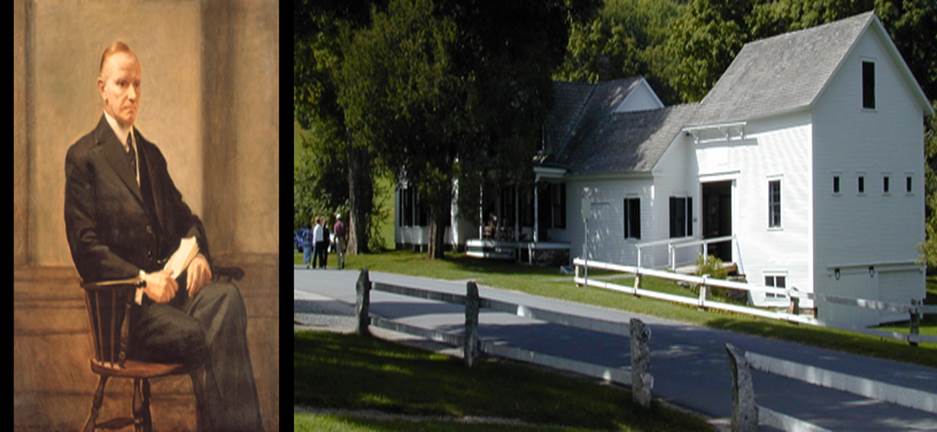
The President Calvin Coolidge State Historic Site holds 29 buildings on 216 acres in the mountains of Vermont. What is striking, beyond the original furniture and historical items, is the respect for the principle that flows through America’s veins: liberty - US Department of Interior
From Sitting Room to White House: 100 Years of Calvin Coolidge
By Robert A. Rider
PA
On August 2, 1923, President Warren Harding unexpectedly fell ill and died while visiting San Francisco. Five hours later, America had a new president: Calvin Coolidge, a man driven by humility, respect, civility, and compassion.
At 2:47 a.m. on August 3, 1923, Coolidge was sworn into the highest office by the light of a kerosene lamp in the humble sitting room of the Coolidge Homestead in Plymouth Notch, Vermont. A Bible belonging to his late mother, who took her final breath in a room just steps away, sat on the small table as his father, Col John Coolidge, read from a copy of the Constitution and administered the oath of office.
Col Coolidge was a local notary public.
Two days later, Col Coolidge wrote a letter to his sister describing the night. He wrote:
After [Calivin] had taken the oath of office at 2:47 he retired until 6:45 at which time he appeared, shaved, ate his breakfast and was ready to depart for Washington at 7:30. During all of the time from 12 until 7:30 all was without any excitement.
For an event that is traditionally paired with much celebration and fanfare, Calvin Coolidge’s presidential service to America began with humility and “without excitement.”
I have had the privilege to attend the Coolidge Centennial Celebration in Plymouth Notch. The President Calvin Coolidge State Historic Site holds 29 buildings on 216 acres in the mountains of Vermont. It is well preserved.
What is striking, beyond the original furniture and historical items, is the respect for the principle that flows through America’s veins: liberty.
Respect for what truly makes America great. Respect for family. Respect for farming. Respect for manufacturing. Respect for the free market. Respect for the individual. The historic site — buildings and land — is littered with cues of liberty.
A visitor could spend days on the site — each building a new reminder of America’s greatness. The Coolidge Homestead, the Wilder house and barns, the General Store with an old Ford parked out front, the Grange Hall that once served as a “summer White House,” and a one-room schoolhouse all sit as physical monuments of what helped shape the values of our 30th president.
Coolidge took these lessons and values from Plymouth Notch to the presidency. In 1926, in Philadelphia, he gave one of his most prominent speeches as commander-in-chief, “ The Inspiration of the Declaration .” It served as a strong reminder of the principles America must preserve. He said:
If all men are created equal, that is final. If they are endowed with inalienable rights, that is final. If governments derive their just powers from the consent of the governed, that is final. No advance, no progress can be made beyond these propositions.
Coolidge knew that being a leader required civility and compassion. He used this while in office to unite the American people and to restore trust. Under Coolidge, the federal budget was balanced every year . He knew that high taxes would cripple the US economy, so he cut taxes regularly and helped prosperity grow. The Revenue Act of 1926 decreased the top marginal tax rate to 25 percent. The national debt fell from $22.3 billion in 1923 to $16.5 billion in 1929.
In 1925, in a speech titled “ Toleration and Liberalism ,” Coolidge made a strong call for unity among all Americans. He said:
Whether one traces his Americanisms back three centuries to the Mayflower, or three years to the steerage, is not half so important as whether his Americanism of today is real and genuine. No matter what various crafts we came here, we are all now in the same boat.
Much like our nation’s first leader, George Washington, Coolidge knew that for the American experiment to survive, individual liberty, paired with unity as a nation, must be paramount. Washington warned us that a king must never rule this land. In his own eloquent way, Coolidge agreed. In his autobiography, he keenly observed:
It is a great advantage to a President, and a major source of safety to the country, for him to know that he is not a great man. When a man begins to feel that he is the only one who can lead in this republic, he is guilty of treason to the spirit of our institutions.
In part, this is why, on Aug. 2, 1927, in Rapid City, South Dakota, Coolidge humbly gave reporters a slip of paper that simply stated, “I do not choose to run for president in 1928” — even though he would have surely won another term in a landslide.
As we mark the centennial of President Calvin Coolidge and move into the 2024 election season, may we, as a nation, reflect on the values of our 30th president. May we remember his humility, respect, civility, and compassion.
( Robert A. Rider is the senior director for the Institute for Faith & Freedom at Grove City College.)

